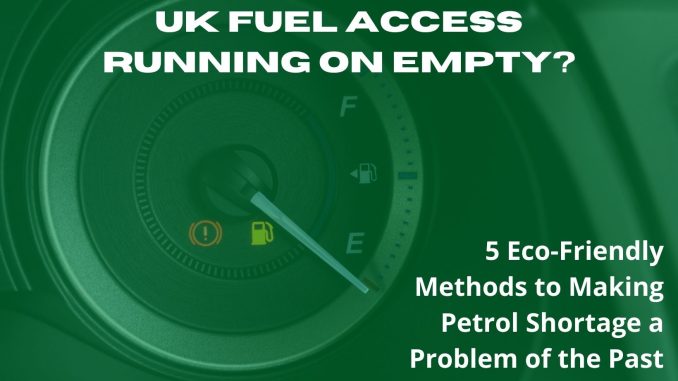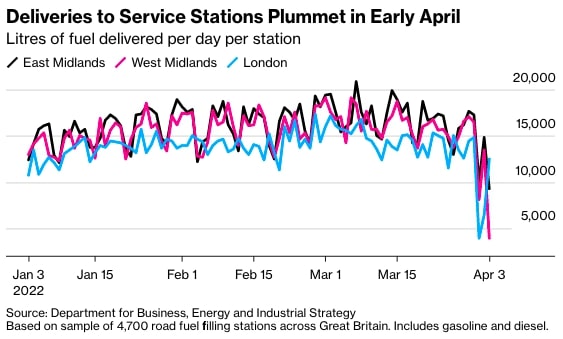
With protests led by environmental activists causing substantial fuel shortages on UK motorways over the Easter weekend, demonstrators are expressing their outrage over how we’ve been ‘caring’ for our planet since the dawn of global warming.
Activists from the unapologetically outspoken climate change coalition ‘Just Stop Oil’ have been very vocal in declaring their disdain by undertaking more proactive measures to drive impactful awareness surrounding the severity of environmental sustainability, quickly making the UK’s fuel shortage issue a controversial hot topic on the eco-friendly landscape.
Wouldn’t it simply be sublime to live on a greener planet where we don’t have to bother with the burden of fossil fuels?
In unpacking the current state of affairs regarding petrol shortages in the UK, this blog entry explores five safer, greener alternatives that enviro-friendly aficionados and subscribers to the ethos of the ‘Just Stop Oil’ movement can adopt in hopes of shifting the tide on climate change.
The UK Fuel Crisis Explained
With fuel prices in the UK reaching record highs this year, motorists are facing tough times as petrol shortages are fast-superseding soaring spikes in the cost of petrol and diesel due to environmental activists blocking major fuel depots.

Image Credit: Bloomberg
From increased demand following post-Covid lockdowns to Russia’s invasion of Ukraine, fuel shortages in the UK have been an ongoing issue, with the ‘Just Stop Oil’ movement the latest inhibitor to fuel supply in the UK.
Activists Unify on a Crusade to ‘Just Stop Oil’
Climate activism group ‘Extinction Rebellion’ has teamed up with ‘Just Stop Oil’ to protest the environmental impact of oil and gas by blocking key terminals across the country:
Heres an update from Grays Oil Terminal, Essex#JustStopOil #NoNewOil #DontLookUp pic.twitter.com/xuN6cVpfmo
— JustStopOil (@JustStop_Oil) April 11, 2022
Deadset on their intentions to disrupt fuel supplies to London and South-East England, the eco-friendly coalition of activists has been unwavering in pushing the UK government to agree to ‘Just Stop Oil’ investments immediately.
The Fuss Over Fossil Fuels
Speaking at the Intergovernmental Panel on Climate Change on February 28th, 2021, Co-Chair Hans-Otto Pörtner stated:
“The scientific evidence is unequivocal; climate change is a threat to human wellbeing and the health of the planet. Any further delay in concerted global action will miss a brief and rapidly closing window to secure a liveable future.”
With the overarching objective to demand that the government immediately halt all future licensing and consents for the exploration, development and production of fossil fuels in the UK, ‘Just Stop Oil’ uses nonviolent civil resistance tactics as a powerful way to demand their rights, freedom, and justice.
“If governments are serious about the climate crisis, there can be no new investments in oil, gas, and coal, from now.” – Fatih Birol, Executive Director, International Energy Agency, 18 May 2021
The UK government is pushing forward by investing a total of £68 million into twenty-four projects based across the UK that have been awarded the first round of funding through the Longer Duration Energy Storage competition. These projects will help to develop new energy storage technologies that can utilise stored energy as heat, electricity or as a low-carbon energy carrier like hydrogen.
The Energy and Climate Change Minister Greg Hands points out that such initiatives will allow the UK to extract the full benefit from its home-grown renewable energy sources, drive down costs and end its reliance on volatile and expensive fossil fuels.
As part of the UK government’s net zero strategy, the transition to clean, renewable energy by increasing the use of clean energy sources like wind and solar power is an attempt to move away from fossil fuels altogether as the prime minister Boris Johnson explains in his campaigns.
Our Net Zero Strategy:
▪️ Unlocks billions of pounds of investment in green technologies
▪️ Creates thousands of jobs in new, future-proof industries
▪️ Sets out how we will end our contribution to climate change and reach #NetZero by 2050More info: https://t.co/sNwiksFE1E pic.twitter.com/Al42cM4TP7
— UK Prime Minister (@10DowningStreet) October 19, 2021
5 Safer Eco-Friendly Alternatives to Forgetting About Fuel
Spoken through the compelling words of former UK Government Chief Scientist Professor Sir David King at the National Climate Emergency Summit in February 2021;
“What we do in the next 3 to 4 years will, I believe, determine the future of humanity.”
With wind turbines and solar panels generating the vast majority of renewable energy, further breakthroughs are needed for the energy sector to cut its ties with fossil fuels for good.
Manufactured to benefit the environment rather than harming it, here are five alternative types of energy that could see us do away with the petrol shortage issue once and for all:
-
Electric Vehicles: There are three different types of electric cars, namely, Battery Electric Vehicles (BEV), Plug-In Hybrid Electric Vehicles (PHEV), and Hybrid Electric Vehicles (HEV). As an environmental and economical alternative to driving cars that run on petrol or diesel, electric vehicles substantially reduce harmful CO2 emissions while relinquishing users of any commitments to soaring fuel prices in the UK. However, it is also worth noting that exceeding a specific number of kilometres (+/- 160km) restricts electric vehicle drivers from driving long distances before needing to recharge. With locating charging stations outside of major cities making electric vehicles unapt for lengthier trips, the fuel logistics industry will only have a new, viable option for transportation once electric cars can carry heavy loads for longer stretches of road.
-
Hydrogen ‘Fuel Cell’ Vehicles: Pioneering progress in tackling the effects of global warming, hydrogen usage is a popular and highly-innovative alternative to gasoline. Distinguished by their reliance on a mixture of oxygen and hydrogen to produce electricity rather than a traditional battery, ‘fuel cell’ cars are technically considered electric vehicles. These electric car variants are different because they are refuelled in the same conventional manner as gasoline and diesel vehicles and share the same long-distance driving range, allowing them to drive further and faster than ordinary battery-powered electric vehicles. Discharging zero harmful emissions and only water, electric vehicles with a fuel cell and an electric motor running on hydrogen can be two to three times more efficient than gasoline. Hydrogen fuel can also be manufactured domestically from nuclear power, natural gas, biomass, and renewable powers like wind and solar energy. The biggest problem associated with hydrogen fuel, however, is its cost. In addition to limited access to filling stations currently offering hydrogen fuel, the cells required to power hydrogen-fuelled cars are highly-priced. If the transportation industry ever decides to switch to hydrogen-powered trucks, the eventual return on investment could get you more bang for your buck.
-
Ethanol Biofuel: Consisting of the same alcohol mixed in most of our cocktails, the origins of ethanol trace back to plant matter, including algae, trees, and corn. Ethanol biofuel is renewable and much better for the environment than gasoline, as it produces less carbon dioxide, hydrocarbon, and nitrogen emissions. Helping reduce our dependence on foreign oil, the production of this biofuel can be domestic, with gasoline often blended with a high percentage of ethanol to create a cleaner-burning fuel. Ethanol production also supports farming and creates agricultural job opportunities. In theory, swiftly transitioning to fuel produced purely from ethanol would be seamless in contrast to other options simply due to the consistent manufacturing of newer trucks with the ability to burn ethanol-mixed gas, thus reducing the likelihood of potential problems in the transportation industry. However, a pivotal point of concern with transitioning to fuel transportation schemes that entirely accommodate ethanol fuel is the adverse effect on crop prices since using crops for fuel rather than for food would drastically increase the cost of corn and other produce. To have ethanol completely replace gasoline, dedicating a significant portion of the world’s forests and uninhabited spaces to farmland would have to be the first of many phases to accomplishing this goal.
-
Natural Gas: Mostly comprised of methane, natural gas is probably one of the most common green fuel types. Not forgetting that fuel manufacturing isn’t merely for motor vehicles, this less expensive alternative to traditional fuels also generates energy for homes and businesses. Although promising cut-backs on greenhouse gas emissions, natural gas, unfortunately, has yet to surpass gasoline as the preferred fuel type because of the limited number of vehicles on the market with the capability to put it to good green use. In addition, the manufacturing of gas-friendly trucks would also be a very costly investment for the trucking industry.
-
Biodiesel: What makes biodiesel a one-of-a-kind enviro-friendly alternative is its many uses.

Image Credit: London.gov.uk
Although biodiesel presents a plethora of positives for our planet, it still has its fair share of challenges, with storage and disposal causing significant problems over time.
Petrol Shortages Clear Sign to Move Away from Fossil Fuels for Good
Deconstructing the ‘disturbance’ debate, a misalignment in the understanding and use of our time is evident – while activists look towards the future, opposers of the nationwide eco protests choose to live in the present. Merely meandering through the wins and losses of each passing day, the main point of contention conveys itself in the notion that Brits could do with fewer protests and more petrol in their lives.
With the implementation of some alternative energy source projects currently in effect, there has been massive momentum to part ways with fossil fuels for good. Not without their fair share of pros and cons, it’s clear that, with the leaps and bounds made so far leading us on a prospectively positive path to a petrol- and oil-free planet, the pursuit of environmental sustainability and the safeguarding of mother earth for future greener generations to come lives on.
![]()
Author Profile
- Online Blogger
- South African wordsmith Zanda Simamane is an enthusiastic, cheerful, conscientious, and talkative individual who is likely to express my emotions, enjoy change and exhibit a lively attitude. In addition to being warm-hearted and outgoing, he is actively interested in others and tolerant of them. Throughout his career, Zanda's exceptional copywriting, editorial, and communication skills have proven valuable in his diverse fields of interest, some of which include Copywriting, PR & Marketing, Entertainment & Fashion Journalism, Social Media, Tech, and Influencer/Talent Management.
Latest entries
 Green GuidesApril 28, 20225 Green Alternatives to Never Worry About Petrol Shortages
Green GuidesApril 28, 20225 Green Alternatives to Never Worry About Petrol Shortages TechnologyMarch 2, 20225 Most Environmentally Friendly Cryptocurrencies for Future Investments
TechnologyMarch 2, 20225 Most Environmentally Friendly Cryptocurrencies for Future Investments Green GuidesNovember 24, 2021The UK’s Most Sustainable 3D Printing Innovations Making Massive Waves in Today’s Eco-Friendly Era
Green GuidesNovember 24, 2021The UK’s Most Sustainable 3D Printing Innovations Making Massive Waves in Today’s Eco-Friendly Era





Leave a Reply
You must be logged in to post a comment.